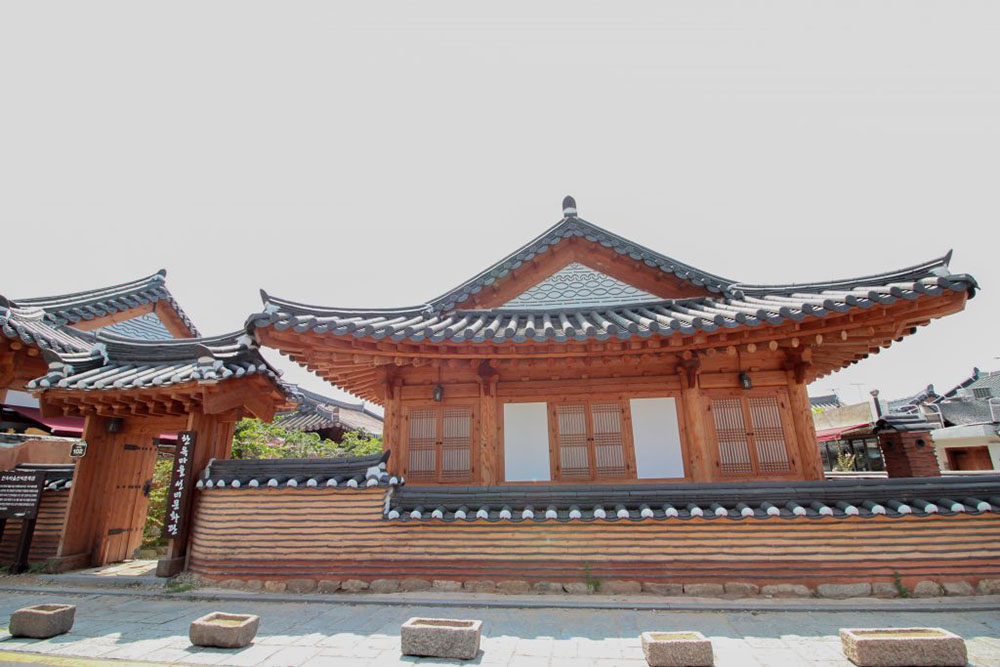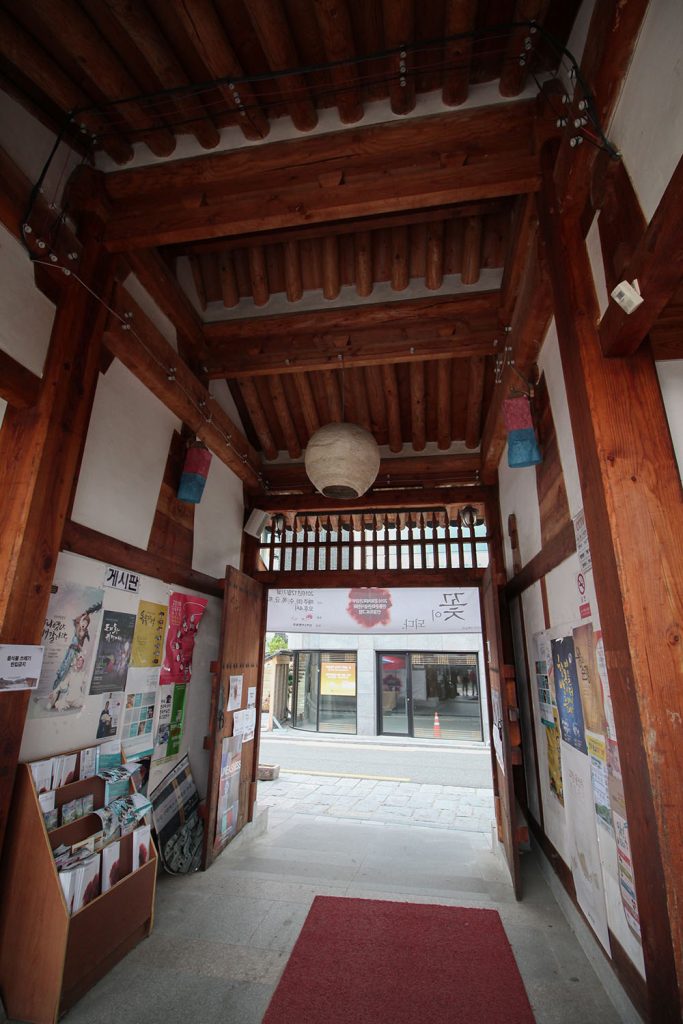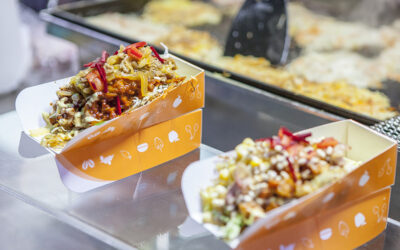Culture Centers in Jeonju Hanok Village: Sori, Buchae, and Seonbi Culture Centers

“What are there to see in Jeonju Hanok Village?”
If your friends are wondering what to see in Jeonju Hanok Village, recommend them to visit the culture centers!
The culture centers, located around the Jeonju Hanok Village, are places for preserving and promoting local heritages. They will make your visit to Jeonju worthwhile.
Let’s head off to the three culture centers of the Hanok Village!
Jeonju Sori Culture Center: Representing Jeonju Pansori Culture


Jeonju Sori* Culture Center is established to preserve and promote the local culture of Pansori.
* ‘sori’ literally means ‘sound’ in Korean, but also can mean Pansori, a genre of traditional Korean music consisting of a long solo epic song
This traditional Korean building, resembling the Korean letter ‘ㄷ,’ hosts an exhibition hall on the history of Pansori and Gukchang (Pansori Master) Oh Jeong-suk Memorial. The center runs educational programs on Pansori and stages regular performances.

The first exhibition hall shows what Pansori is and how Pansori developed in Jeonju. The collections also highlight Jeonju Daesaseup Nori* and its past winners.
*Jeonju Daesaseup Nori is a contest on Pansori and other traditional arts. The contest first started hundreds of years ago, during Joseon Dynasty.



Reading the introduction to the successive winners of Jeonju Daesaseup Nori, I could learn their passion for Pansori.

The second exhibition hall hosts the memorial of the Pansori Master Oh Jeong-suk, a designated Living National Treasure. Pansori Master Oh devoted her life to the art of Pansori and passing down this cultural heritage to the next generation of singers.


Inside the memorial was screening a short film about the life of Pansori Master Oh. I could learn what her life as a Pansori Master was like.

The main building of Jeonju Sori Culture Center, Daechungmaru, holds small concerts and other programs for visitors.



The regular weekday performances are being held every Thursday and Friday at 8PM in the courtyard of the culture center. The Korean classical opera named ‘Yuyujajeok’ (living freely from worldly cares) is being staged.


Apart from exhibitions and performances, the culture center is a place for visitors to rest and experience Korean traditional plays. I strongly recommend you to visit Jeonju Sori Culture Center to learn about Pansori!
<Jeonju Sori Culture Center>
Address: 56, Hanji-gil, Wansan-gu, Jeonju
Phone: 063) 231-0771~2
Opening Hours: 10:00AM – 7:00PM (closed on Mondays)
Entrance Fee: free (there’s a fee for regular performances)
Homepage: http://sori.jjcf.or.kr/main/sori/
Jeonju Buchae Culture Center: Where the Breeze of Jeonju Starts


Jeonju Buchae (Korean traditional fan) Culture Center exhibits Korean traditional fan and runs experience and learning programs on fan-making. Since Joseon Dynasty, Jeonju has been famous for producing quality fans. The culture center, opened in October 2011, succeeds this traditional artisanship.

Inside the culture center, varieties of Jeonju Buchaes, including the ones made by master Buchae craftsmen, were on display. I could also learn about their history and how they are made.




It is said that the word ‘Buchae’ (‘부채’) is a combination of ‘buchida’ (‘부치다’: making wind by waving hand) and ‘chae’ (채: indicate that something is made of bamboo). I could see Taegeukseon, the representative Buchae of Korea, and Hapjukseon, the typical traditional Korean Buchae. There were also the masterpiece Buchaes made by master Buchae craftsman and the exhibitions on how they were made.


People were participating in the Buchae-making program. They were creating their own Buchae by drawing pictures on the Hanji (traditional Korean paper) and assembling the ribs of the Buchae.




On every last Wednesday of the month, Jeonju Buchae Culture Center hosts arts and humanities school, consisting of experience programs on literature, arts, and traditional culture and the Buchae class run by the master Buchae craftsman. If you can attend both, you’re very lucky!
<Jeonju Buchae Culture Center>
Address: 93, Gyeonggijeon-gil, Wansan-gu, Jeonju
Phone: 063) 231-1774
Opening Hours: 9:00AM – 6:00PM (closed on Mondays, Seolnal, and Chuseok)
Entrance Fee: free
Experience Programs:
Drawing on Buchae 7,000won ~ 10,000won
Making Buchae 7,000won ~ 10,000won
Jeonju Seonbi Culture Center: Into the Life and Culture of the Local Confucian Scholars


At Jeonju Seonbi Culture Center, you can learn the lives, thoughts, and arts of Seonbi (Confucian scholar). The center shows what Jeonju Hanok Village was like 100 years ago through the lives of Seonbis that resisted the Japanese colonial rule.


Past the exhibition hall entrance is the map of Jeonju Hanok Village. Under the title ‘Walking with Seonbi,’ this map marks the spots signifying the Jeonju Seonbi culture. The map is a special tour guide, introducing the house of Gang-am Song Sung-yong, a famous master calligrapher of Jeonju, and other spots including Jeonju Hyanggyo (the local Confucian school), Omokdae Pavilion, and Hanbyeokdang Pavilion.





I could also learn the history of the local Confucianism and the stories of Jeonju Hanok Village and Jeonju Hyanggyo through the eyes of Seonbi culture. There also were the relics of renowned local Confucian scholars on display.

I recommend visiting Jeonju Seonbi Culture Center when you’ve become curious of the centuries-old history and Confucian culture of Jeonju Hanok Village.
<Jeonju Seonbi Culture Center>
Address: 102, Hanji-gil, Wansan-gu, Jeonju
Phone: 063) 288-5124
Opening Hours: 10:00AM – 6:00PM (closed on Mondays)
Entrance Fee: free



최신 댓글